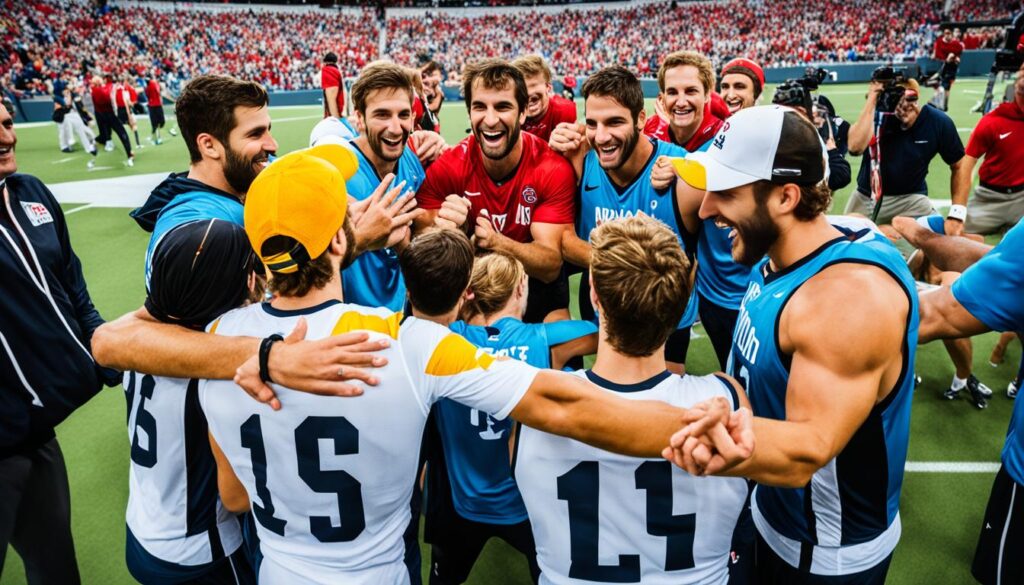Fair play stands as the core of integrity, respect, and sportsmanship in sports. It upholds game morals and encourages healthy competition. Sportsmanship means playing fair, respecting others, and staying true to the game’s spirit.
It greatly contributes to athlete development. It teaches values like fairness, honesty, and respect. These values shape character and enhance the sports experience.
Sportsmanship skills come from mutual respect, self-reflection, and teamwork. By valuing sportsmanship, we foster a culture of understanding, compassion, and everyone’s inclusion in sports.
Key Takeaways:
- Sportsmanship is crucial in sports, as it inculcates values like fairness, honesty, and respect.
- Fostering sportsmanship skills requires teaching and modelling positive behaviour, encouraging self-reflection, and creating a supportive environment.
- Embracing sportsmanship promotes integrity, empathy, and inclusivity in the sporting world.
The Benefits of Good Sportsmanship
Good sportsmanship positively affects both individuals and society. It reaches beyond the field, boosting personal growth and fostering harmony. By valuing and teaching it, we nurture an environment filled with fairness, respect, and unity.
One major perk of sportsmanship is how it lifts self-esteem and confidence. Athletes who compete with honour and respect their opponents feel proud. This pride doesn’t just stick to the sports arena. It spills over, improving their well-being and how they relate to others.
Good sportsmanship also teaches teamwork and cooperation. Athletes learn to work together, communicate well, and aim for a shared goal. Teams grow stronger and more successful by appreciating everyone’s efforts and backing each other up.
Another key part of sportsmanship is building resilience and perseverance. Athletes will face tough times, losses, and challenges. With a positive attitude and fair play, they learn to bounce back and keep pushing forward.
Sportsmanship fosters community and unity too. Showing respect and fairness on the field makes sports more inclusive and diverse. It welcomes everyone, creating a strong sense of belonging and connecting communities closer together.
Positive role models are crucial for instilling good sportsmanship. That’s where coaches and parents come in. They set good examples and emphasize growth over just winning. This approach puts the value of sportsmanship front and center.
Providing helpful feedback is another way to encourage sportsmanship. Coaches and mentors stress fair play’s significance. They help athletes see the effects of their actions, promoting constant growth.
The Benefits of Good Sportsmanship
| Benefits of Good Sportsmanship |
|---|
| Enhances self-esteem and self-confidence |
| Promotes teamwork and cooperation |
| Fosters resilience and perseverance |
| Builds a sense of community and unity |
| Reduces aggression and conflict |
| Encourages inclusivity and diversity |
Strategies for Nurturing Good Sportsmanship
Nurturing good sportsmanship takes everyone’s effort. This includes athletes, coaches, and parents. Together, we can build an environment that supports teamwork. It helps develop sportsmanship skills. And, it strengthens the spirit of good sportsmanship.
Teaching and Modeling Positive Behavior
Teaching and showing positive behaviour are key. Coaches and parents should lead by example. They must show fairness, respect, and integrity on and off the field. This way, athletes see what good sportsmanship looks like and are likely to imitate it.
Talking about what makes good sportsmanship is also helpful. Start conversations about teamwork’s value and what healthy competition means. This can show the good side of sportsmanship.
Fostering a Supportive and Inclusive Sports Environment
A supportive atmosphere is crucial for good sportsmanship. Coaches and parents need to make everyone feel welcome. It doesn’t matter what their skills or backgrounds are. We should celebrate teamwork and personal growth over winning alone.
“Sportsmanship is not only about how we treat our opponents but also about how we treat our teammates, coaches, officials, and the game itself.”
We should celebrate hard work and getting better. This teaches athletes to focus on growing and playing fair. Understanding the value of honesty and adhering to game rules is important. It helps foster a culture that values sportsmanship.
Providing Constructive Feedback and Guidance
Constructive feedback helps athletes grow. Coaches and parents should focus on an athlete’s actions and attitude, not just their wins or losses. This helps athletes look at their behaviour and learn from it.
We should teach them to handle disagreements and communicate well. This guidance helps them deal with challenges honestly and with sportsmanship.
Empowering Athletes to Resolve Conflicts
Learning to resolve conflicts is important for sportsmanship. Coaches and parents should encourage athletes to sort out problems on their own. They should use communication, compromise, and empathy.
Having open talks and giving tools for resolving disputes is crucial. This allows athletes to seek solutions that work for everyone. It helps promote an environment of respect and good sportsmanship.
With these strategies, everyone can contribute to nurturing good sportsmanship. A culture of fairness, respect, and teamwork helps athletes grow. It promotes good sportsmanship throughout the game.
| Benefits of Nurturing Good Sportsmanship | Strategies for Nurturing Good Sportsmanship |
|---|---|
| Enhances teamwork and cooperation | Teaching and modelling positive behaviour |
| Promotes fair play in sports | Fostering a supportive and inclusive sports environment |
| Develops valuable sportsmanship skills | Providing constructive feedback and guidance |
| Builds a culture of respect and integrity | Empowering athletes to resolve conflicts |
| Creates a positive and enriching sports experience |
The Thrill of Victory vs. the Sting of Defeat
Victory and defeat are a big part of sports. They help shape who we are and how we handle challenges. Winning feels great, but how we deal with losing shows our true spirit. It teaches us valuable lessons for life.
Winning brings joy and proves hard work pays off. It’s exciting to see the payoff of all that effort. But, winning isn’t everything. How we act when we lose shows our real character.
Defeat is tough and can be hard to take. It can make athletes feel a lot of things, like disappointment and even anger. It’s scary to think about letting people down. But, these moments really show what sportsmanship is all about.
“Good sportsmanship is not just about playing fair when you win; it’s about showing grace and respect when you lose.”
Sportsmanship is key in sports education. It’s about learning fairness, integrity, and respect. Showing good sportsmanship, especially in defeat, means you’re growing and showing maturity.
Sportsmanship offers lessons on being humble, thinking about ourselves, and learning from failure. Losing with grace lets athletes see what they can do better. It helps them grow stronger for next time.
Coaches and parents need to set good examples. They should stress fair play and respect. This way, athletes learn to take wins and losses well. A supportive environment teaches that loss doesn’t define us. There’s always something to learn.
Through sportsmanship, athletes build a strong base for success in sports and life. Handling wins humbly and losses with strength make them better prepared for life’s ups and downs.
Key Takeaways:
- Victory and defeat are inevitable in sports, offering valuable lessons and shaping individuals’ characters.
- Sportsmanship is demonstrated not only in victory but also in how athletes handle defeat.
- Teaching sportsmanship fosters resilience, self-reflection, and personal growth.
- Coaches and parents play a crucial role in modelling and teaching sportsmanship values.
Dealing with the Loss
Losing in sports can be tough and emotional. These hard times show how important sportsmanship is. It’s key to admit and talk about your feelings to move forward.
It’s also crucial to find good ways to deal with these tough emotions. Activities like chatting with a mentor, writing down your thoughts, or having a team meeting can help. These can turn your upset feelings into something positive.
Every loss teaches us something. Viewing defeat as a chance to get better teaches sportsmanship. By working on ourselves and aiming to improve, we can turn losses into lessons for future wins.
“Sportsmanship is not just about winning. It’s about how you handle defeat and respond to adversity.”
After a loss, accepting it without blaming others is important. Blaming others stops you from growing. Take charge of your actions and use this as a push to improve.
The support from fans, friends, and coaches is super important in moving forward. Kind words and helpful advice can rebuild confidence. A supportive sports community helps everyone grow and show good sportsmanship.

When you lose, it’s key to get up and keep going. Success in sports means overcoming setbacks. Staying true to the sport shows true character. With the right attitude and dedication to sportsmanship, athletes can come back stronger and more focused.
| Benefits of Dealing with Loss | Importance of Sportsmanship | Teaching Sportsmanship |
|---|---|---|
| Opportunity for personal growth and improvement | Fosters respect, fairness, and integrity | Develops empathy and teamwork |
| Enhances resilience and perseverance | Promotes a positive and supportive sports environment | Cultivates a sense of sportsmanship values |
| Builds character and emotional intelligence | Reduces aggression and conflict | Encourages inclusivity and diversity |
Conclusion
Sportsmanship is key for fair play and teaches important lessons. It makes the sports experience better and builds a positive space for athletes.
Modeling good behavior helps create a respectful and honest atmosphere. It leads to personal growth. Inclusive and supportive environments encourage athletes to show sportsmanship. This helps them learn skills for life outside sports.
Remember, winning and losing are part of sports. How athletes handle both can shape their character. It promotes a community that values fair play and respect.
FAQ
What is the importance of sportsmanship?
Sportsmanship is key because it builds a solid base for fair play, honesty, and respect in sports. It helps athletes learn valuable lessons like respect, fairness, and honesty.
What are the benefits of good sportsmanship?
Good sportsmanship boosts self-respect, encourages working together, and helps bounce back from setbacks. It creates a strong community feeling, reduces mean behaviour, and welcomes everyone.
How can we nurture good sportsmanship?
To grow good sportsmanship, teach and show positive actions. Build a welcoming team atmosphere, and give helpful feedback and advice.
What is the thrill of victory vs. the sting of defeat?
Winning feels great as a prize for effort while losing can be tough. How we deal with both can show a lot about a person’s spirit and fairness in sports.
How can we deal with the loss?
When we lose, it’s important to feel and talk about our feelings, find positive ways to deal with disappointment and learn from the experience. It matters to accept defeat without pointing fingers and to always try again.





